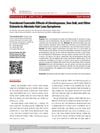 7 citations,
January 2009 in “International Journal of Trichology”
7 citations,
January 2009 in “International Journal of Trichology” Dermoscopy can't help doctors identify scalp irritation caused by topical minoxidil.
 72 citations,
December 2012 in “Expert Opinion on Drug Delivery”
72 citations,
December 2012 in “Expert Opinion on Drug Delivery” Niosomes are promising for skin drug delivery, offering benefits like improved drug penetration and stability.
 39 citations,
June 2017 in “Journal of Applied Research on Medicinal and Aromatic Plants”
39 citations,
June 2017 in “Journal of Applied Research on Medicinal and Aromatic Plants” Plant-based ingredients are effective and safe for modern skincare products.
 28 citations,
September 2019 in “International Journal of Nanomedicine”
28 citations,
September 2019 in “International Journal of Nanomedicine” Minoxidil nanoparticles can potentially be a more effective treatment for hair growth than current treatments.
 27 citations,
September 2018 in “Medicines”
27 citations,
September 2018 in “Medicines” Oleic acid nanovesicles improve minoxidil absorption in hair follicles for alopecia treatment.
 27 citations,
August 2018 in “Therapeutic Delivery”
27 citations,
August 2018 in “Therapeutic Delivery” Nanotechnology could make hair loss treatments more effective and reduce side effects, but more research is needed before it's available.
 4 citations,
March 2021 in “Asian Journal of Beauty and Cosmetology”
4 citations,
March 2021 in “Asian Journal of Beauty and Cosmetology” Dendropanax, sea salt, and other extracts can help reduce hair loss and promote hair growth.
 1 citations,
October 2001 in “Journal of Wood Science”
1 citations,
October 2001 in “Journal of Wood Science” Some extracts from woods and fungi can promote hair growth better than a known hair growth substance.

Curry leaves offer health benefits and can be used safely in various forms for digestion, diabetes control, and hair growth.
 July 2023 in “International journal of advanced research in medical and pharmaceutical sciences”
July 2023 in “International journal of advanced research in medical and pharmaceutical sciences” The gel combining minoxidil and Aloe vera could be an effective, non-irritating treatment for hair loss.
 March 2017 in “Fundamental & Clinical Pharmacology”
March 2017 in “Fundamental & Clinical Pharmacology” The model and estimator can predict drug exposure in kidney transplant patients well.
 January 1997 in “Elsevier eBooks”
January 1997 in “Elsevier eBooks” The document explains how shampoos clean, rinses condition, one-step shampoos offer convenience, and hair growth promoters aim to prevent hair loss, emphasizing the importance of scientific evidence for their effectiveness.
 233 citations,
February 2018 in “Polymers”
233 citations,
February 2018 in “Polymers” Chitin and chitosan are useful in cosmetics for oral care, haircare, and skincare, including UV protection and strength improvement.
 164 citations,
April 2008 in “Cochrane library”
164 citations,
April 2008 in “Cochrane library” Current treatments for alopecia show no significant long-term benefits.
 151 citations,
November 2018 in “International Journal of Pharmaceutics”
151 citations,
November 2018 in “International Journal of Pharmaceutics” Nanoparticles improve drug delivery through the skin but more research is needed on their long-term effects and skin penetration challenges.
 149 citations,
September 2017 in “Pharmaceutics”
149 citations,
September 2017 in “Pharmaceutics” Pig skin is a good substitute for human skin to measure drug absorption, but differences in skin structure and enzymes across species must be considered.
 111 citations,
March 2012 in “Expert Opinion on Drug Delivery”
111 citations,
March 2012 in “Expert Opinion on Drug Delivery” Liposomes could improve how skin care products work but are costly and not very stable.
 108 citations,
December 2003 in “Lasers in surgery and medicine”
108 citations,
December 2003 in “Lasers in surgery and medicine” ICG-enhanced NIR laser therapy may be a promising acne treatment with improvement and no side effects.
 96 citations,
September 2017 in “Analytica Chimica Acta”
96 citations,
September 2017 in “Analytica Chimica Acta” Hair elemental analysis could be useful for health and exposure assessment but requires more standardization and research.
 69 citations,
December 2015 in “Journal of Controlled Release”
69 citations,
December 2015 in “Journal of Controlled Release” Nanocapsules can improve clobetasol delivery to hair follicles, reducing side effects.
 69 citations,
December 2011 in “Journal of Ethnopharmacology”
69 citations,
December 2011 in “Journal of Ethnopharmacology” Some Thai plants, especially Carthamus tinctorius, could help prevent hair loss and promote hair growth without adverse effects.
 45 citations,
September 2012 in “Life Sciences”
45 citations,
September 2012 in “Life Sciences” Aconiti Ciliare Tuber extract may help hair grow by activating a specific cell signaling pathway.
 40 citations,
November 2017 in “International journal of nanomedicine”
40 citations,
November 2017 in “International journal of nanomedicine” DA liposomes with chloramphenicol effectively target hair follicles and combat MRSA with minimal skin toxicity.
 37 citations,
May 1999 in “Australasian Journal of Dermatology”
37 citations,
May 1999 in “Australasian Journal of Dermatology” Early diagnosis and treatment are crucial for preventing permanent hair loss in various scalp conditions, and while new treatments are promising, more research is needed to evaluate their effectiveness.
 35 citations,
January 2018 in “Skin pharmacology and physiology”
35 citations,
January 2018 in “Skin pharmacology and physiology” Nanoemulsion creams with certain enhancers can greatly increase caffeine delivery through skin.
 27 citations,
February 2017 in “Clinical, Cosmetic and Investigational Dermatology”
27 citations,
February 2017 in “Clinical, Cosmetic and Investigational Dermatology” New compounds were found to help increase hair growth and decrease hair loss.
 22 citations,
March 2020 in “Cosmetics”
22 citations,
March 2020 in “Cosmetics” Nanotechnology improves minoxidil treatment for hair loss.
 19 citations,
November 2011
19 citations,
November 2011 Using systemic drugs as creams for skin conditions shows promise, but more research is needed to confirm their effectiveness and safety.
 18 citations,
April 2011 in “International Journal of Molecular Medicine”
18 citations,
April 2011 in “International Journal of Molecular Medicine” Dihydrotestosterone causes p27 protein breakdown in ovarian and breast cancer cells by binding with SKP2.
 16 citations,
September 2018 in “Journal of Molecular Liquids”
16 citations,
September 2018 in “Journal of Molecular Liquids” The PS-b-PAA copolymer nanomicelles are effective for delivering a cancer treatment drug in photodynamic therapy.






























